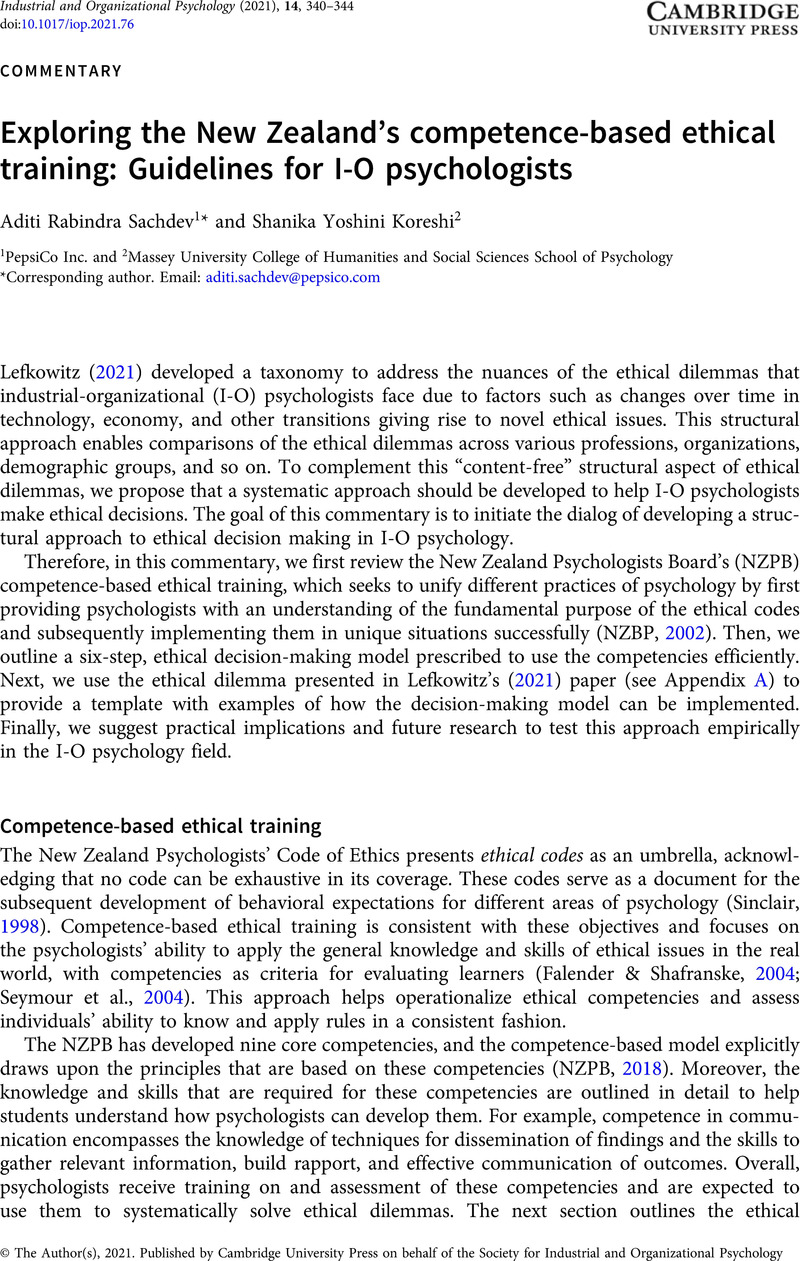No CrossRef data available.
Article contents
Exploring the New Zealand’s competence-based ethical training: Guidelines for I-O psychologists
Published online by Cambridge University Press: 22 September 2021
Abstract
An abstract is not available for this content so a preview has been provided. Please use the Get access link above for information on how to access this content.

- Type
- Commentaries
- Information
- Copyright
- © The Author(s), 2021. Published by Cambridge University Press on behalf of the Society for Industrial and Organizational Psychology
References
du Preez, E., & Goedeke, S. (2016). Ethical decision-making for psychologists in Aotearoa New Zealand context. In Rucklidge, J. J., Feather, J. S., Robertson, N. R., & New Zealand Psychological, Society (Eds.), Professional practice of psychology in Aotearoa New Zealand (pp. 339–349). New Zealand Psychological Society.Google Scholar
Falender, C. A., & Shafranske, E. P. (2004). Clinical supervision: A competency-based approach. American Psychological Association.CrossRefGoogle Scholar
Gottlieb, M. C. (1993). Avoiding exploitive dual relationships: A decision-making model. Psychotherapy: Theory, Research, Practice, Training, 30(1), 41–48.CrossRefGoogle ScholarPubMed
Lefkowitz, J. (2021). Forms of ethical dilemmas in industrial-organizational psychology. Industrial and Organizational Psychology: Perspectives on Science and Practice, 14(3), 297–319.Google Scholar
Lincoln, S. H., & Holmes, E. K. (2010). The psychology of making ethical decisions: What affects the decision? Psychological Services, 7(2), 57–64.CrossRefGoogle Scholar
Lindsay, G. (2012). Ethical decision making. In Leach, M. M., Stevens, M. J., Lindsay, G., Ferrero, A., & Korkut, Y. (Eds.), The Oxford handbook of international psychological ethics (pp. 74–89). Oxford University Press.Google Scholar
Nagy, T. F. (2010). Approaches to ethical decision making. In Nagy, T. F. (Ed.), Essential ethics for psychologists: A primer for understanding and mastering core issues (pp. 147–170). American Psychological Association
Google Scholar
New Zealand Psychologists Board. (2018). Core competencies for the practice of psychology in Aotearoa/New Zealand. http://www.psychologistsboard.org.nz/cms_show_download.php?id=533
Google Scholar
New Zealand Psychologists Board. (2002). Code of ethics for psychologists working in Aotearoa New Zealand. http://www.psychologistsboard.org.nz/cms_show_download.php?id=237
Google Scholar
Sey, mour, F., Nairn, R., & Austin, J. (2004). Comments on Tim Williams’ paper, “Setting Impossible Standards: The model of ethical decision-making associated with the New Zealand psychologists’ code of ethics.” New Zealand Journal of Psychology, 33(1), 33–34.Google Scholar
Sinclair, C. (1998). Nine unique features of the Canadian Code of ethics for psychologists. Canadian Psychology/Psychologie canadienne, 39(3), 167–176.CrossRefGoogle Scholar
Thompson, S., & Thompson, N. (2008). What is reflective practice? In Thompson, S. & Thompson, N. (Eds.), The critically reflective practitioner (pp. 7–31). Palgrave Macmillan.
CrossRefGoogle Scholar


